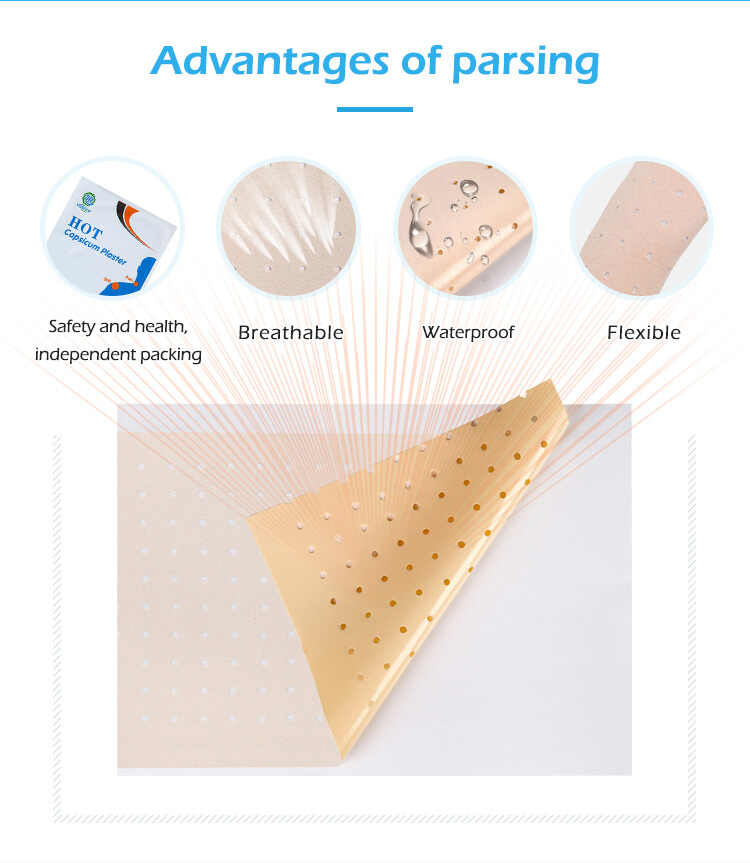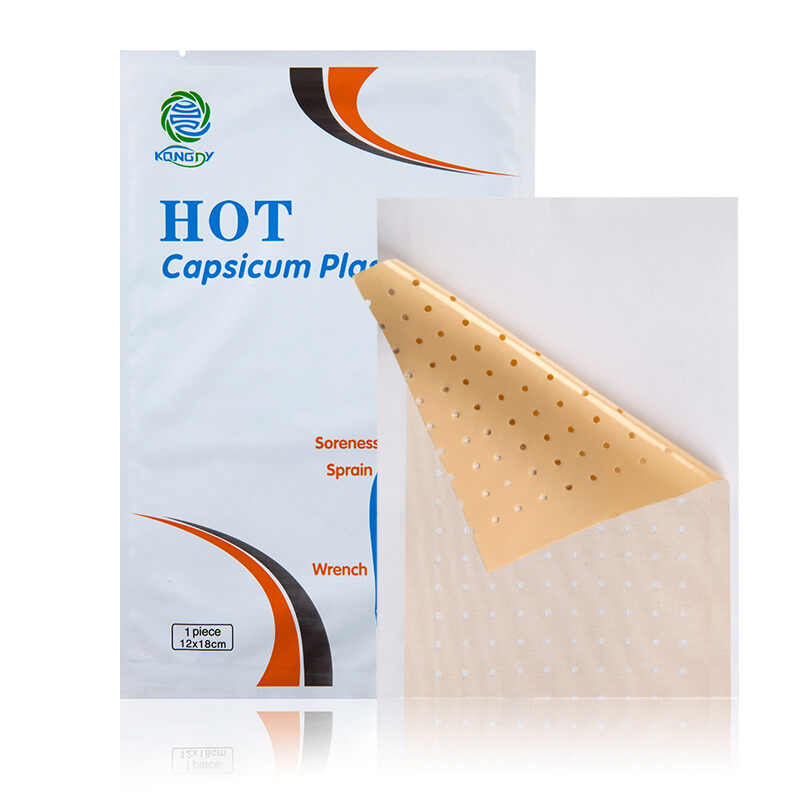What Is the Most Important Certification for a Capsicum Heat Plaster OEM?
In the competitive and highly regulated world of transdermal therapeutic products, such as Capsicum Heat Plasters, certifications are more than formalities — they are critical indicators of quality, safety, trustworthiness, and regulatory compliance. Whether you're partnering with a Capsicum Heat Plaster Manufacturer for a Custom Capsicum Heat Plaster, launching a Private Label Capsicum Heat Plaster, or evaluating an overseas Capsicum Heat Plaster Supplier, one essential question arises:
What is the most important certification for a Capsicum Heat Plaster OEM?
This article provides a comprehensive breakdown of the most essential certifications a Capsicum Heat Plaster OEM should have, why they matter, and how they affect your product’s legal standing and market potential — especially in regulated regions like the U.S., EU, and Asia.

Why Certifications Matter in the OEM Manufacturing of Capsicum Heat Plasters
Before identifying the single “most important” certification, it’s vital to understand the role certifications play when choosing a Capsicum Heat Plaster Supplier or OEM Manufacturer:
Assurance of product safety and efficacy
Compliance with international standards
Market access and legal approval
Risk mitigation for your brand
Consumer trust and credibility
Facilitation of import/export procedures
For businesses seeking to offer Custom Capsicum Heat Plasters or launch a Private Label Capsicum Heat Plaster, working with a certified manufacturer is not optional — it’s essential for success.
The Most Important Certification: GMP (Good Manufacturing Practice)
Among all certifications, GMP (Good Manufacturing Practice) stands out as the most critical for a Capsicum Heat Plaster OEM.
What Is GMP?
GMP is a set of globally recognized guidelines that ensure products are consistently produced and controlled according to quality standards. It covers:
Manufacturing hygiene
Raw material sourcing and validation
Quality control testing
Staff training and facility management
Traceability and documentation
GMP is enforced by health authorities such as:
FDA (U.S. Food and Drug Administration)
WHO (World Health Organization)
EMA (European Medicines Agency)
NMPA (China’s National Medical Products Administration)
Why GMP Is the Top Priority
For any Capsicum Heat Plaster Manufacturer, GMP certification proves that the production environment, equipment, and processes meet the necessary standards for producing safe and effective medical-grade products.
Without GMP, there’s no baseline assurance of:
Product consistency
Microbial safety
Ingredient accuracy
Batch control and traceability
This puts your brand at legal risk and could lead to failed audits, product recalls, or consumer harm.
Other Essential Certifications for a Capsicum Heat Plaster Manufacturer
While GMP is the cornerstone, it’s not the only certification you should look for when choosing a Capsicum Heat Plaster OEM. Here are other vital credentials, especially for international trade:
1. ISO 13485: Medical Devices Quality Management Systems
ISO 13485 is globally recognized and specific to medical device manufacturing, including transdermal patches like Capsicum Heat Plasters.
Key Advantages:
Aligns with EU MDR and FDA expectations
Covers product design, testing, labeling, and sterilization
Ensures risk management and process validation
Essential for CE and FDA submissions
If your Custom Capsicum Heat Plaster will be marketed as a Class I or II medical device, ISO 13485 is a must.
2. CE Marking (Conformité Européenne)
Required for selling in European Economic Area (EEA) countries, the CE mark indicates that the Capsicum Heat Plaster OEM meets EU health, safety, and environmental standards.
Highlights:
Necessary for EU retail, e-commerce, and pharmacy channels
Validates safety, biocompatibility, and labeling accuracy
Requires clinical data or performance testing
For Private Label distributors targeting Europe, CE certification ensures compliance and smooth customs clearance.
3. FDA Registration (U.S. Food and Drug Administration)
If your products are being imported into the United States, FDA registration is crucial.
What it includes:
Manufacturer and facility registration
Device listing (for transdermal plasters)
Label review and packaging compliance
Product classification as OTC (over-the-counter) or device
Partnering with an FDA-registered Capsicum Heat Plaster Supplier reduces the risk of customs seizure or regulatory fines.
4. MSDS (Material Safety Data Sheet) and COA (Certificate of Analysis)
While not “certifications” per se, these documents are vital when working with a Custom Capsicum Heat Plaster OEM:
MSDS provides chemical safety data, transport classification, and storage instructions.
COA validates that each batch meets ingredient and performance specifications.
These documents support international shipping, product registration, and end-user transparency.
How Certifications Impact Custom and Private Label Products
If you're launching a Private Label Capsicum Heat Plaster, you may rely on your supplier’s existing certifications. However, if you’re developing a Custom Capsicum Heat Plaster with new ingredients or packaging, you might need to:
Participate in the regulatory filing
Provide product safety data
Work with your manufacturer on updated documentation
Thus, choosing a fully certified Capsicum Heat Plaster OEM streamlines your go-to-market process and reduces regulatory hurdles.
Questions to Ask Your Capsicum Heat Plaster OEM or Supplier
Before finalizing your partnership, ask these certification-related questions:
Do you hold GMP certification? From which authority?
Is your facility ISO 13485 certified?
Do you provide CE or FDA-compliant products?
Can you support us with regulatory documentation (e.g., MSDS, COA, Technical File)?
Are your Private Label Capsicum Heat Plasters already registered in major markets?
Do you help with documentation for custom formulations?
A reputable Capsicum Heat Plaster Manufacturer should answer all of these confidently and provide documentation upon request.
Benefits of Working with a Certified Capsicum Heat Plaster Manufacturer
✅ Global Market Access
Products manufactured under GMP and ISO 13485 can be exported and registered in most countries with minimal regulatory friction.
✅ Reduced Legal Risk
Certified manufacturing processes lower your exposure to product liability and compliance violations.
✅ Enhanced Brand Reputation
Certification logos and claims on your packaging increase consumer confidence and perceived value.
✅ Streamlined Customization
With certified quality systems in place, developing a Custom Capsicum Heat Plaster is faster, safer, and more scalable.
✅ Easier Private Label Launches
Certified Capsicum Heat Plaster Suppliers often have pre-approved formulations and packaging that simplify your entry to market.
Real-World Example: Certification-Backed Success
Case Study: A U.S.-based wellness brand wanted to launch a Private Label Capsicum Heat Plaster in North America and Europe. By selecting a GMP and ISO 13485 certified OEM supplier in Asia, they were able to:
Skip the product testing phase thanks to existing data
Register the product with the FDA and obtain CE marking
Launch simultaneously in Amazon US, Germany, and Spain
This wouldn’t have been possible without a fully certified manufacturer.
Conclusion: Certification is the Foundation of Trust and Compliance
So, what is the most important certification for a Capsicum Heat Plaster OEM?
Without a doubt, it is GMP certification, as it sets the standard for quality, safety, and legal compliance. However, in today’s complex regulatory environment, it’s best to choose a Capsicum Heat Plaster Manufacturer that also holds ISO 13485, CE, FDA, and other relevant credentials.
Whether you're developing a Custom Capsicum Heat Plaster from scratch or opting for a Private Label Capsicum Heat Plaster, certifications ensure you’re building a product — and a brand — that consumers and regulators can trust.
When choosing a Capsicum Heat Plaster Supplier, don’t just ask for pricing or lead time. Ask for proof of certification — because in this industry, quality isn’t just an advantage. It’s a requirement.
Related Questions and Answers
Q1: Can I sell Capsicum Heat Plasters without GMP certification?
A: No. Without GMP, your product may not meet minimum regulatory requirements, especially in developed markets like the U.S. or EU.
Q2: Do I need both GMP and ISO 13485 certifications for a Custom Capsicum Heat Plaster?
A: Ideally, yes. GMP ensures production quality, while ISO 13485 aligns with medical device regulations.
Q3: What happens if my Capsicum Heat Plaster Supplier lacks FDA registration?
A: Your products may be held or rejected at customs in the U.S., delaying your launch and potentially incurring fines.
Q4: Can Private Label Capsicum Heat Plasters carry CE and FDA logos?
A: Yes, if the OEM supplier is certified and the product meets the required regulatory standards.
Q5: How do I verify a Capsicum Heat Plaster Manufacturer’s certifications?
A: Ask for official documents, audit reports, or check their listing on regulatory websites like FDA.gov or SGS databases.






